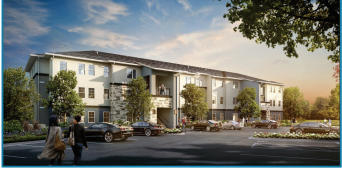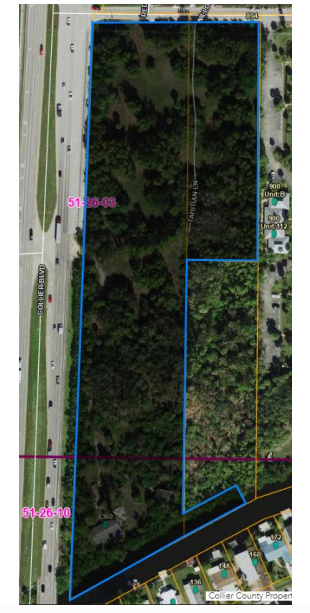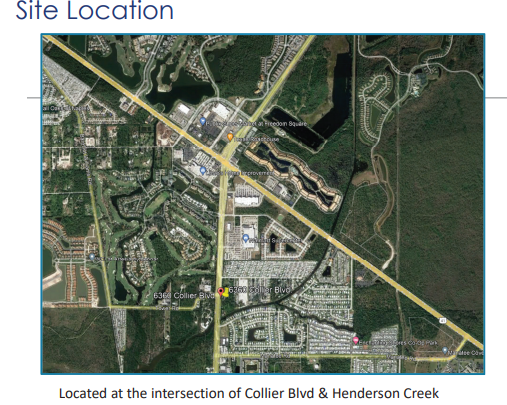Collier commission advances affordable housing project that would tap taxpayer money

Collier commissioners reconsidered, then reapproved a developer's application for taxpayer money to build affordable housing.
While they all seemed to agree the project is imperfect, commissioners voted unanimously Tuesday to keep moving it forward.
After the application won unanimous approval in late January, Commissioner Bill McDaniel asked for a reconsideration at a board meeting a few weeks later.
A majority of the board then agreed to rehear it the next time they met.
After the first vote, McDaniel said new information had come to light that triggered new questions and concerns in his mind, which he wanted the developer and county staff to address in the public eye. He felt there hadn't been enough discussion about the site's location and existing zoning, and the project's potential impacts on the environment, traffic and neighbors.
He also wanted more information about the structure of the deal and a better understanding of the developer's need for taxpayer money to build the apartments.
To help finance its project, the developer McDowell Housing Partners asked for up to $3.75 million to secure the land for it. Under the agreement, the county would buy the land, then lease it back to the developer.
The money for the land purchase will come from a one-cent tax county voters approved for capital projects.
The county set aside $20 million to fund land acquisitions for lower-than-market housing from the tax before it expired last year. While several proposals have been floated by private and nonprofit developers, McDowell Housing Partners is the first to make it this far through the application and approval process.
In case you missed it: Collier commissioners advance first proposal to build workforce housing with surtax money
More: Collier commission to reconsider application for taxpayer dollars to build workforce housing
The roughly 7.5-acre site the developer has chosen for the project is at the corner of Collier Boulevard and Henderson Creek Drive, a half mile south of U.S. 41, not far from Marco Island. It sits close to Henderson Creek, which flows into Rookery Bay, a protected estuary, so its sparked environmental concerns.
Changes made to site plan
In the weeks before the revote, the developer worked with county staff and commissioner McDaniel to address his uneasiness about the project, making improvements that he and other commissioners praised before approving the application again.
Changes to the site plan included shifting a preserve to the east, so it's no longer adjacent to Henderson Creek, and it can act as a better buffer to neighbors living in two-story condos.
"Undoubtedly, you will see some building, but it's not going to be looming over you," explained Christopher Shear, the chief operating officer for McDowell Housing Partners.
The developer's plans call for a seven-story building, plus a clubhouse, with other amenities, which may include a dog park, pool and playground. There would be a total of 160 apartments, with 64 one-bedroom, 84 two-bedroom and 12 three-bedroom units in the mix.
For added environmental protection, the developer has agreed to put a conservation easement over the preserve, so it can never be built upon. The project will not include a public park, nor provide public access to Henderson Creek, ideas the developer had kicked around before facing a backlash from neighbors.
There won't even be a dock at the creek, only seating near its edge for residents of the apartments to enjoy the waterfront views, Shear said.
"That will be the extent of it," he reassured commissioners, and neighbors.
Shear, along with an engineering consultant, explained in detail how stormwater will be handled on the site, run through a "treatment train" that will reduce runoff, remove pollutants and improve water quality. The system will include catch basins, filters and underground vaults for water storage.
There have also been tweaks to the road access, with outgoing traffic directed onto Collier Boulevard, with plans for the addition of a no-exit sign to Henderson Creek Drive from the apartment complex to help reduce its impact on neighbors, and the local street.
Sidewalk improvements are planned along Collier Boulevard, near the entrance, as well, Shear said.

The project's original height, at 70 feet, and density, at 21 units to an acre, haven't changed, but they are less than what's allowed by the state's Live Local Act, designed to incentivize the development of affordable housing across Florida. What's proposed is what's needed to make the development financially doable, and for it to still qualify for state funding, which is based on that specific design, Shear said.
Dubbed Ekos on Collier, the proposed rental community would be "100% affordable" and target essential workers, such as teachers, police officers, firefighters, and other "civil servants," including county employees, as well as seniors and veterans. The units would be set aside for those making anywhere from 30% to 80% of the area's median income, with those commitments locked in for years to come, based on the requirements of the financing agreements, Shear clarified.
As part of the partnership with the county, the developer would sign a 99-year lease to keep the units affordable for at least that many years, with the potential to extend the agreement.
The county commission must still approve a contract to purchase the property, along with a developer agreement.
While he voted in favor of the application for taxpayer funding for a second time, McDaniel continued to express reservations about the project, including its shortage of parking, which doesn't meet county code.
"I'm not your enemy," he told the developer, while expressing the need to get the parking right, on what he described as a constrained site.
He suggested that county staff collect water quality data in the area where the project is planned to better measure or gauge its environmental impacts on Henderson Creek once it's built. Staff agreed to get on it.
A 'pivotal place' for affordable housing
County staff noted the critical need to provide more affordable housing, and pointed out the apartments would require approvals and permits from many agencies, from the South Florida Water Management District to the Florida Department of Transportation, that will scrutinize and get into the nitty-gritty of the details.
"This is really a pivotal place for us to be able to have some attainable housing for folks," commented Trinity Scott, the county's head of transportation management services.
The Florida Department of Transportation will take the lead in reviewing and dealing with the traffic impacts because Collier Boulevard is a state road, with the agency weighing in on what it will and won't allow to be built, alongside it, she explained.
At the hearing, a handful of residents weighed in, both for and against the proposed development.
Resident Bobby Williams said he opposed it for a number of reasons, including fears of stormwater runoff into Henderson Creek and uncontrolled traffic and flooding from such an intense project.
"I am pro development, but I also want to make sure our environment is kept," he said. "I've seen it go away with development."
Terry Dignan, who lives nearby, said one of his biggest concerns is the additional traffic the project will bring to the neighborhood, especially during peak hours, when so many of its residents will be coming and going to work.
"It's going to be a mess," he said.

Elizabeth Radi, a spokeswoman for the Collier Tenants Union, argued in favor of the project, saying it would only be a drop in the bucket to address a giant need for more affordable housing in the county.
The problem, she said, is about to get worse, with the Federal Emergency Management Agency expected to end its direct housing program soon, which has provided temporary trailers to victims of Hurricane Ian.
She praised McDowell Housing Partners for wanting to be part of the solution to the housing crisis, and for its genuine passion toward that end, with multiple projects built, planned and proposed in the county.
Without the benefit of the developer's housing, she said more residents are "fixin' to go homeless."

Resident Doug Williams, who lives in workforce housing built on county-owned land by the same developer, off Santa Barbara Boulevard, said it has been a godsend for him, as a single father, and he's grateful to have a modern, comfortable place to live with his daughter, which is hard to come by on his income in Collier County.
Previously, he said he relied on friends for places to stay, due to financial and relationship issues, despite working hard and having a steady job.
"We got to remember, we are people," he said, "and who wants to live on the street? Who doesn't want to be able to live in a comfortable environment, where you can raise your family and be part of society, right? That's what we want. We all want that."
No reason for a pause?
Commissioner Burt Saunders motioned to reapprove the developer's application for tax money. He was the only one of four commissioners to vote against the reconsideration, seeing it as unnecessary, and describing it as a "fire drill."
"If there's a problem down the road, we can deal with it," he said.
He stressed the importance of the county's funding to make the apartments attainable to more low-income residents, and emphasized the project would be much better for it, with the ability to house veterans, seniors and others on more meager incomes.
The commissioner also pointed out that a larger and more intense affordable housing project could be built on the site, with more expensive rent for residents making 100% to 120% of the area's median income, without the county commission's input or approval, under the Live Local Act.
Collier's median income now stands at more than $100,000 (for a family of four). The median is the midpoint, at which half make more and half less.
Commissioner Rick LoCastro seconded the motion to move ahead with the application.
"Sometimes, you have to vote for the thing that you hate the least," he said.
Actually, LoCastro said there is a lot to like about the project, including the fact that it has been proposed by a reputable developer, with a good track record.
While he acknowledged there is already heavy traffic in the area around the chosen location, he said if apartments aren't built on the land, it could be developed with another shopping center under its current zoning, which would create even more road congestion, and isn't really what's needed there.
"I would really hate for us to turn our backs on this, and not move forward," LoCastro said of the affordable housing option, which he described as a rare opportunity.
He added: "It's not really like we are screaming for another strip mall there."
This article originally appeared on Naples Daily News: Collier board advances affordable housing project after reconsideration

